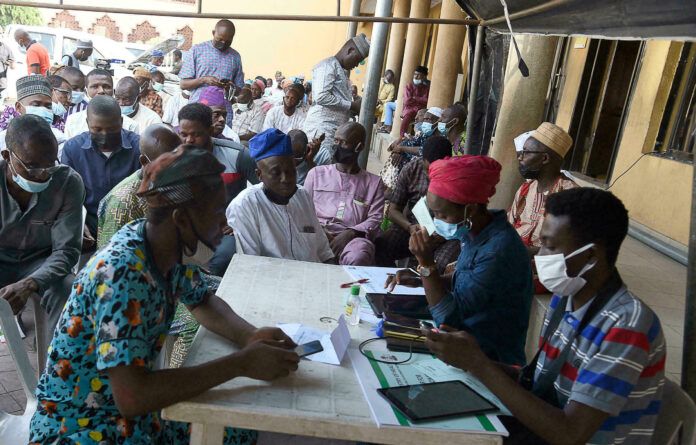At the Ikoyi Baptist Church, in a recent Sunday sermon, a pastor delivered a message from the pulpit: Do the right thing and get the jab.
Downstairs in the carpark in the wealthy Ikoyi area of Nigeria’s economic capital Lagos, worshippers in their Sunday finest lined up to register for a first shot of a Covid-19 vaccine.
Fearing a surge in cases over the holiday season and wary of new variants, Nigeria is recruiting religious leaders, churches, mosques and government offices to mobilise its vaccination campaign.
Those worries will likely deepen after Nigeria on Wednesday reported its first cases of the Omicron variant that has prompted new travel bans.
Africa’s most populous nation has so far mostly escaped the brunt of the global pandemic that ravaged Europe and elsewhere after coronavirus emerged in December 2019.
Recorded cases are low — around 214,000 registered infections and just under 3,000 deaths since the pandemic began — although that is likely partly due to low testing rates.
But the country of some 210 million people has fully vaccinated only 3.5 million people and given 6.5 million one shot — far off a target of innoculating around 112 million, or 70 percent of the adult population, by the end of next year.
For a religious society like Nigeria, churches and mosques have in the past proven effective in mobilising sceptical communities to get vaccinated as they were with a polio campaign a decade ago.
“The mosques and churches get the largest crowds. It is also a way to reduce the risk and access more people,” said Dr. Atinuke Onayiga, a senior Lagos health official visiting the Ikoyi church.
“A lot of people don’t want to queue up, so we bring it to their doorstep.”
Across the other side of Lagos, in the mainland district of Alausa, Friday prayers at the Lagos State Secretariat mosque followed a similar pattern.
“Now it’s happening here, I should do it,” said Lawal Abujeli, 35, sitting in a white plastic chair outside the mosque waiting to be vaccinated.
“I wasn’t interested before, but here I can trust it.”
– Office by office –
In another effort to promote mass vaccinations, Nigerian federal government employees are now required to show evidence of vaccination or a Covid test before entering offices.
Outside some federal buildings in the capital Abuja, dozens of workers were turned away on Wednesday as new rules were enforced. Some were directed to vaccine centres.
“I am not sick. I am not going to take a test,” said civil servant Ifeanyi Nwazo. “They want to force us to get an injection. Why?”
Health authorities plan office-to-office vaccinations in federal buildings.
Dr Ismail Abdus-Salam, Lagos state Covid response incident manager, said religious houses were also a effective way to spread the word back to communities.
“We also improve awareness,” he said outside the Alausa mosque. “They spread the message to people: ‘I’ve been vaccinated and there is no problem with me, and you can get vaccinated’.”
But for some worshippers like Mustapha Adetay, even the mosque campaign had yet to shake off their worries about the jab.
“I am still doubting to be sincere, some say it has negative health effects,” said Adetay, 53, an engineer, walking out of the mosque.
“If I was convinced, I would have all my family take it. But I am not really convinced. But I will think about it.”


